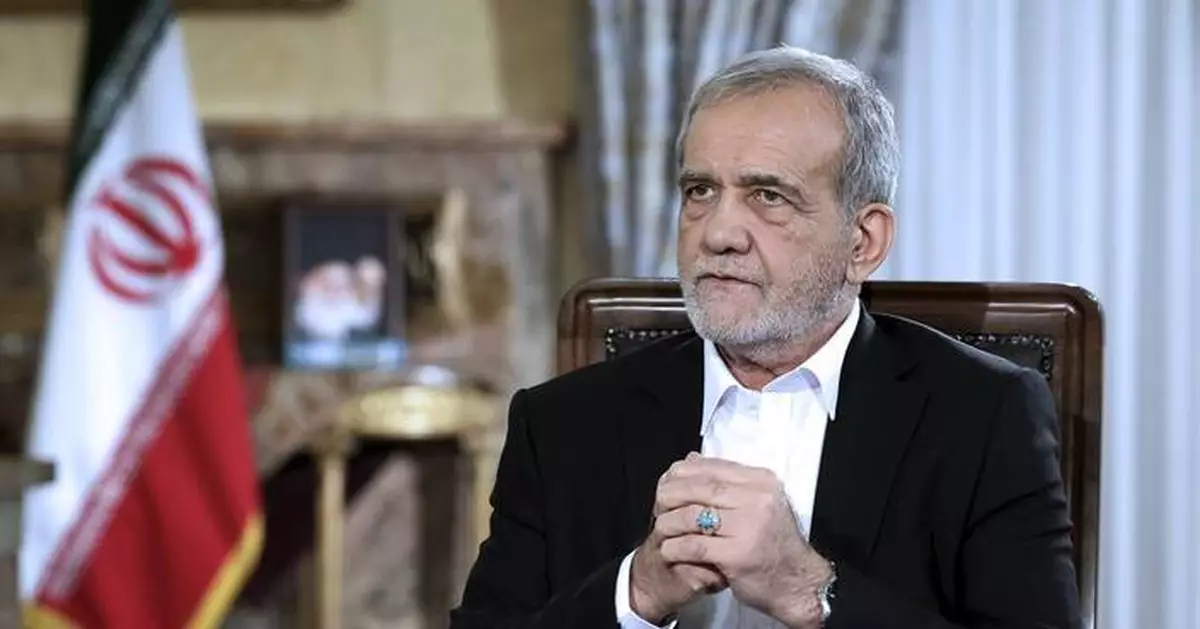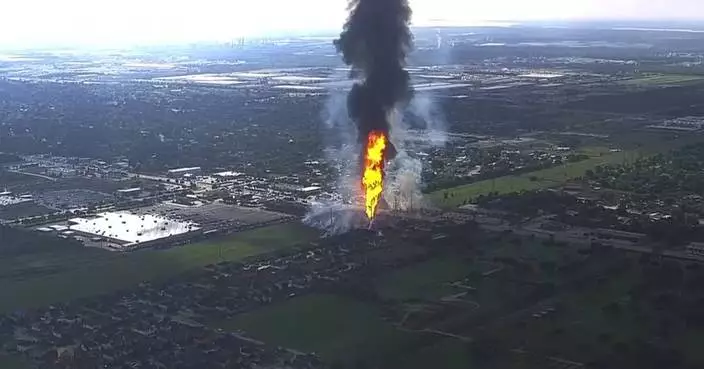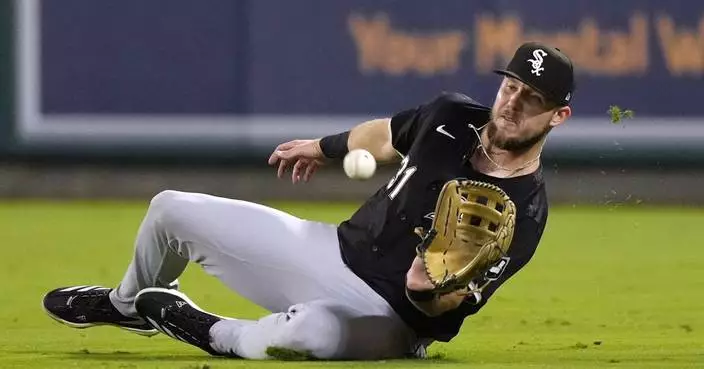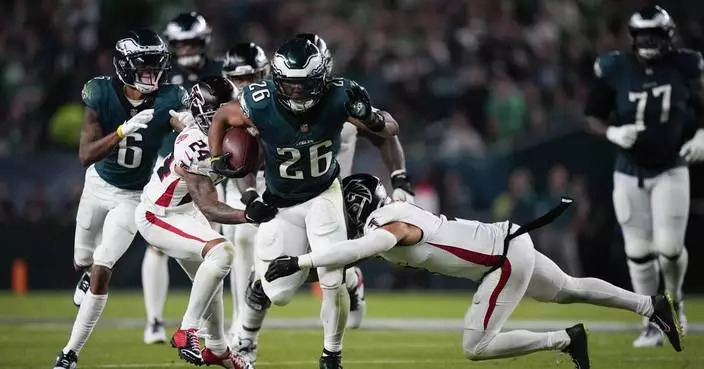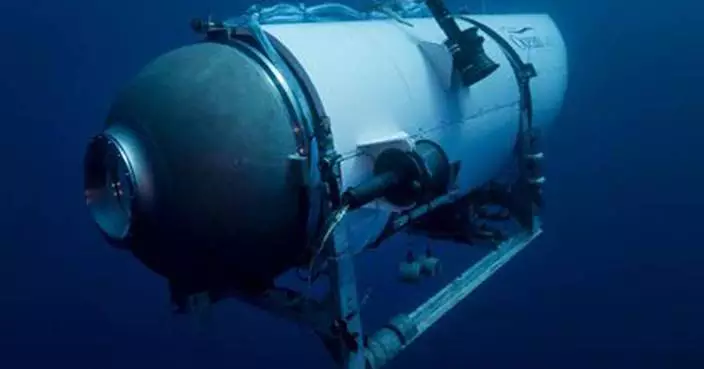BAGHDAD (AP) — Iranian President Masoud Pezeshkian on Wednesday slammed the West, saying that Israel is “committing massacres” in the war in Gaza and using European and American weapons to do so.
Pezeshkian, who spoke in Baghdad at the start of his first visit abroad since taking office, is hoping to cement Tehran’s ties to Baghdad as regional tensions increasingly pull both majority Shiite countries into the widening Middle East fray.
Click to Gallery
BAGHDAD (AP) — Iranian President Masoud Pezeshkian on Wednesday slammed the West, saying that Israel is “committing massacres” in the war in Gaza and using European and American weapons to do so.
Iranian President Masoud Pezeshkian, left, and Iraqi Prime Minister Mohammed Shia al-Sudani shake hands at the government palace in Baghdad, Iraq, Wednesday, Sept. 11, 2024. (Ahmed Jalil/Pool Photo via AP)
Iranian President Masoud Pezeshkian is welcomed by Iraqi Prime Minister Mohammed Shia al-Sudani, right, with an official ceremony at the Baghdad International Airport in Baghdad, Iraq, Wednesday Sept. 11, 2024. (Murtadha Al-Sudani/Pool Photo via AP)
Iranian President Masoud Pezeshkian is welcomed by Iraqi Prime Minister Mohammed Shia al-Sudani, right, with an official ceremony at the Baghdad International Airport in Baghdad, Iraq, Wednesday Sept. 11, 2024. (Murtadha Al-Sudani/Pool Photo via AP)
Iranian President Masoud Pezeshkian is welcomed by Iraqi Prime Minister Mohammed Shia al-Sudani, right, with an official ceremony at the Baghdad International Airport in Baghdad, Iraq, Wednesday Sept. 11, 2024. (Murtadha Al-Sudani/Pool Photo via AP)
Iranian President Masoud Pezeshkian, center, is welcomed by Iraqi Prime Minister Mohammed Shia al-Sudani, left, with an official ceremony at the Baghdad International Airport in Baghdad, Iraq, Wednesday Sept. 11, 2024. (Murtadha Al-Sudani/Pool Photo via AP)
Iranian President Masoud Pezeshkian is welcomed by Iraqi Prime Minister Mohammed Shia al-Sudani, left, with an official ceremony at the Baghdad International Airport in Baghdad, Iraq, Wednesday Sept. 11, 2024. (Murtadha Al-Sudani/Pool Photo via AP)
Iranian President Masoud Pezeshkian arrives at the Baghdad International Airport in Baghdad, Iraq, Wednesday Sept. 11, 2024. (Murtadha Al-Sudani/Pool Photo via AP)
Iranian President Masoud Pezeshkian meets Iraqi Prime Minister Mohammed Shia al-Sudani, unseen, at the government palace in Baghdad, Iraq, Wednesday, Sept. 11, 2024. (Ahmed Jalil/Pool Photo via AP)
Iranian President Masoud Pezeshkian, center left, and Iraqi Prime Minister Mohammed Shia al-Sudani, center right, meet at the government palace in Baghdad, Iraq, Wednesday, Sept. 11, 2024. (Ahmed Jalil/Pool Photo via AP)
In this photo released by the Iranian Presidency Office, President Masoud Pezeshkian speaks in a live televised interview by state TV, at his office in Tehran, Iran, Saturday, Aug. 31, 2024. (Iranian Presidency Office via AP)
Iran has been a staunch supporter of the Palestinian militant Hamas group since its Oct. 7 attack on southern Israel that sparked the war in the Gaza Strip. More than 40,000 Palestinians have been killed in Gaza since the war erupted, according to local health officials. The war has also caused vast destruction and displaced around 90% of Gaza’s population of 2.3 million, often multiple times.
“The Israeli entity is committing massacres against women, children, young men and elderly. They bomb hospitals and schools,” Pezeshkian said.
“All these crimes are being committed by using European and American ammunition and bombs,” he added, without elaborating.
Ahead of Pezeshkian’s arrival, an explosion struck a site near Baghdad International Airport used by the U.S. military on Tuesday night. There were no reported casualties and the circumstances of the explosion were unclear.
The U.S. Embassy later described it as an “attack” on the Baghdad Diplomatic Services Compound, an American diplomatic facility, and that it was “assessing the damage” and the cause of the explosion. It didn't provide further details.
Pezeshkian's visit is significant for both countries.
For Iran, its relationship with Iraq remains crucial for economic, political and religious reasons — something that has especially been true since the U.S.-led 2003 invasion of Iraq toppled dictator Saddam Hussein, who launched a bloody, yearslong war against Iran in the 1980s.
Baghdad, meanwhile, has been trying to balance its relationship with Tehran, which backs powerful Shiite militias in the country, as well as with the United States, which maintains a force of 2,500 troops in Iraq that remain in battle with remnants of the once-dominant extremist Islamic State group.
The American troops remain both a literal and rhetoric target for Iran, particularly as Israel's nearly year-old war on Hamas in Gaza grinds on.
Iraq’s Prime Minister Mohammed Shia al-Sudani told reporters during a joint news conference with Pezeshkian that the two neighboring countries on Wednesday signed 14 memorandums of understanding to boost relations. He also pledged that Iraq’s airspace will not be used for attacks on the Islamic Republic — an apparent reference to Israel.
Pezeshkian, who was sworn in as Iran's new president in July, is also to visit Shiite shrines in the Iraqi holy cities of Karbala and Najaf, a railroad project to link the southern city of Basra to Iran and Irbil, the capital of Iraq's semiautonomous northern Kurdish region.
Still, there have been tensions between Iran and Iraq, particularly after Iranian missiles hit sites in Iraq in attacks over the past six years, targeting Kurdish militias, a base housing American forces and also what Tehran alleged were Israeli sites in Iraq.
Iran also fired missiles and flew drones over Iraq in its unprecedented direct attack on Israel in April. That attack followed a suspected Israeli strike on an Iranian diplomatic compound in Damascus, Syria, that killed two Iranian generals and five officers, as well as a member of the Lebanese Shiite militia Hezbollah, an Iranian ally.
The Islamic Republic has also threatened further retaliation against Israel over the July assassination of Hamas leader Ismail Haniyeh in Tehran, which could include another missile barrage.
Iraq also needs the close ties to maintain Baghdad's supply of imported Iranian natural gas to meet its electricity needs. A barter deal for Iraqi crude oil has seen the supply continue, though U.S. sanctions targeting Tehran over its rapidly advancing nuclear program have put pressure on Baghdad.
Meanwhile Tuesday, the United States and Britain formally accused Iran of supplying short-range ballistic missiles to Russia to use against Ukraine, announcing new sanctions on both Moscow and Tehran.
The continued presence of U.S. troops in Iraq remains a concern for Iran. Since the Israel-Hamas war broke out, Iraqi militias allied with Iran have targeted U.S. forces here, leading to American airstrikes targeting the militias. Iraqi politicians continue to debate the issue of whether to back having American troops remain in the country.
Associated Press writers Nasser Karimi in Tehran, Iran, Jon Gambrell in Dubai, United Arab Emirates, and Bassem Mroue in Beirut contributed to this report.
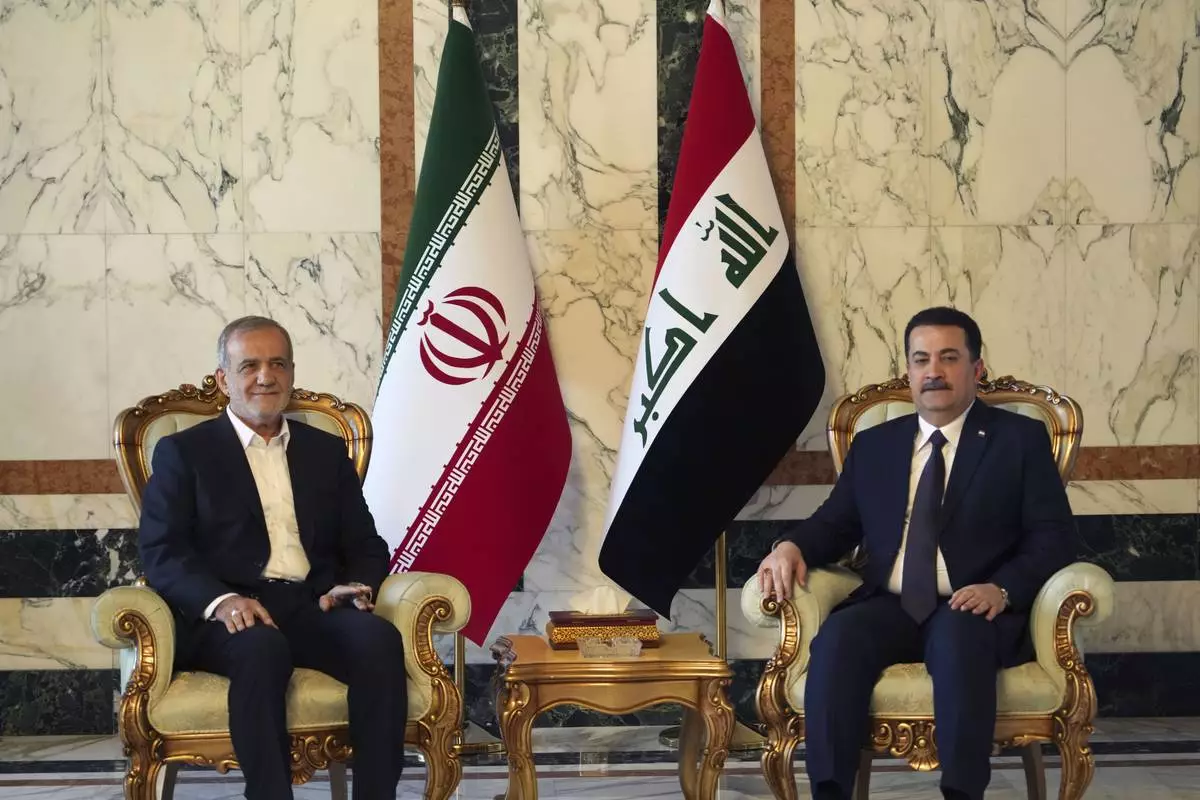
Iranian President Masoud Pezeshkian, left, is welcomed by Iraqi Prime Minister Mohammed Shia al-Sudani, right, in Baghdad, Iraq, Wednesday Sept. 11, 2024. (Murtadha Al-Sudani/Pool Photo via AP)
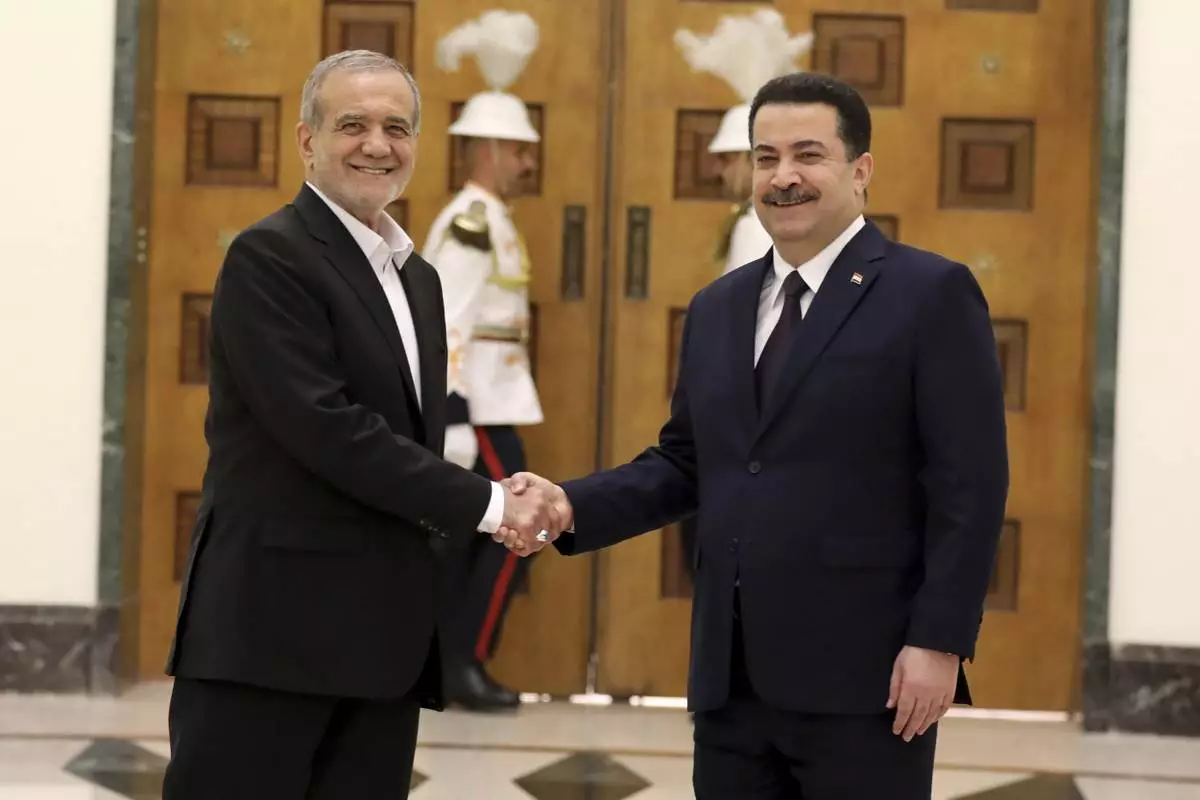
Iranian President Masoud Pezeshkian, left, and Iraqi Prime Minister Mohammed Shia al-Sudani shake hands at the government palace in Baghdad, Iraq, Wednesday, Sept. 11, 2024. (Ahmed Jalil/Pool Photo via AP)
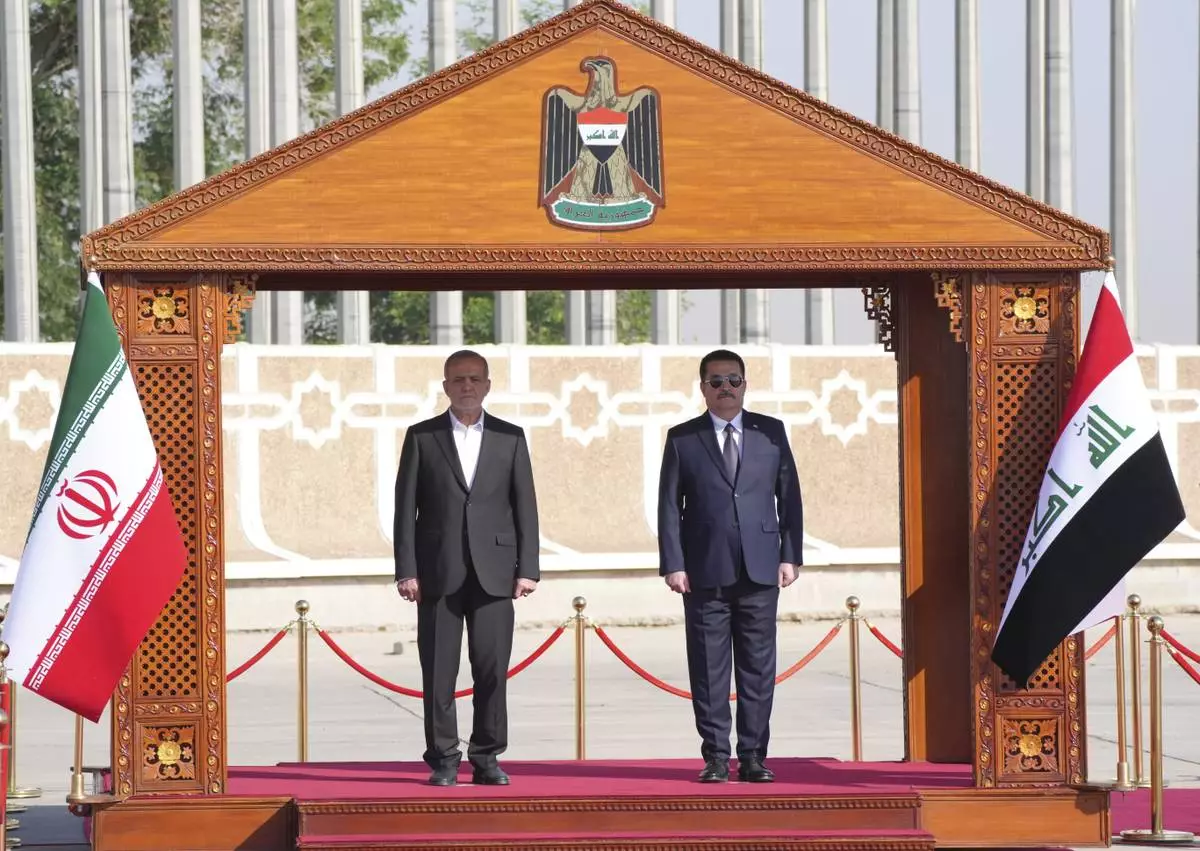
Iranian President Masoud Pezeshkian is welcomed by Iraqi Prime Minister Mohammed Shia al-Sudani, right, with an official ceremony at the Baghdad International Airport in Baghdad, Iraq, Wednesday Sept. 11, 2024. (Murtadha Al-Sudani/Pool Photo via AP)
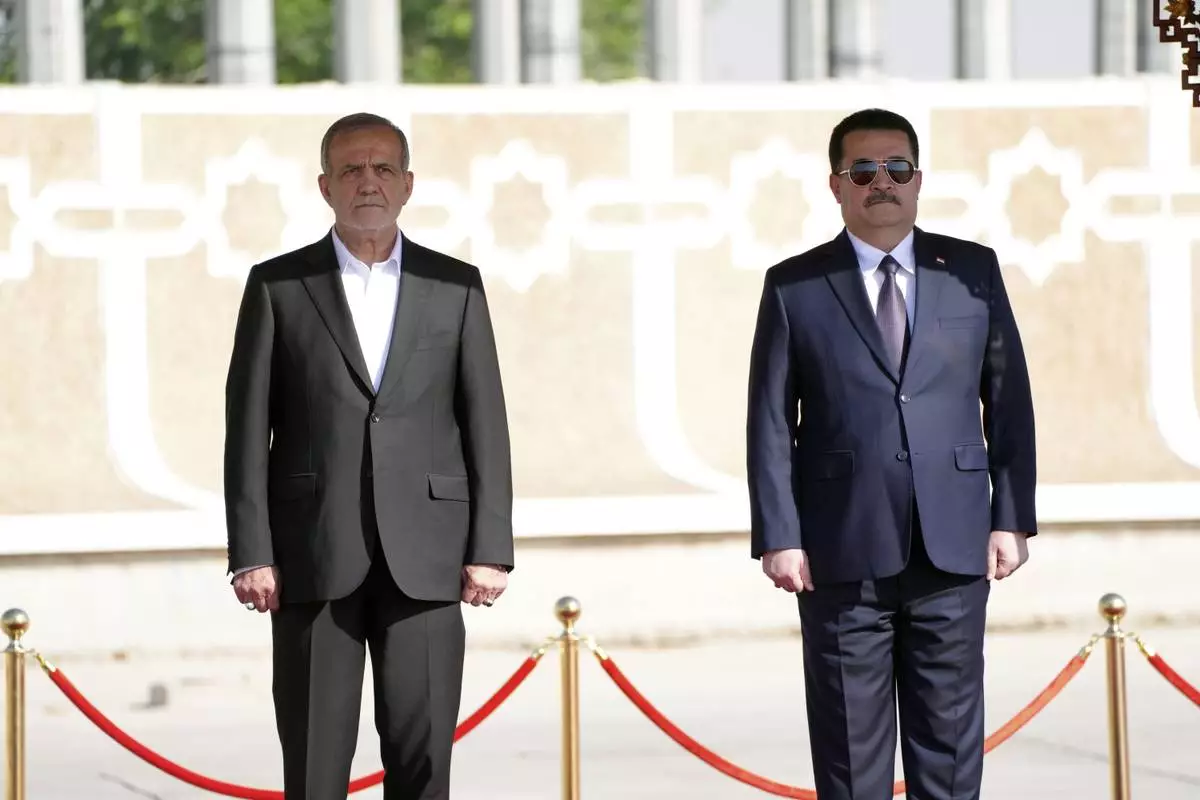
Iranian President Masoud Pezeshkian is welcomed by Iraqi Prime Minister Mohammed Shia al-Sudani, right, with an official ceremony at the Baghdad International Airport in Baghdad, Iraq, Wednesday Sept. 11, 2024. (Murtadha Al-Sudani/Pool Photo via AP)
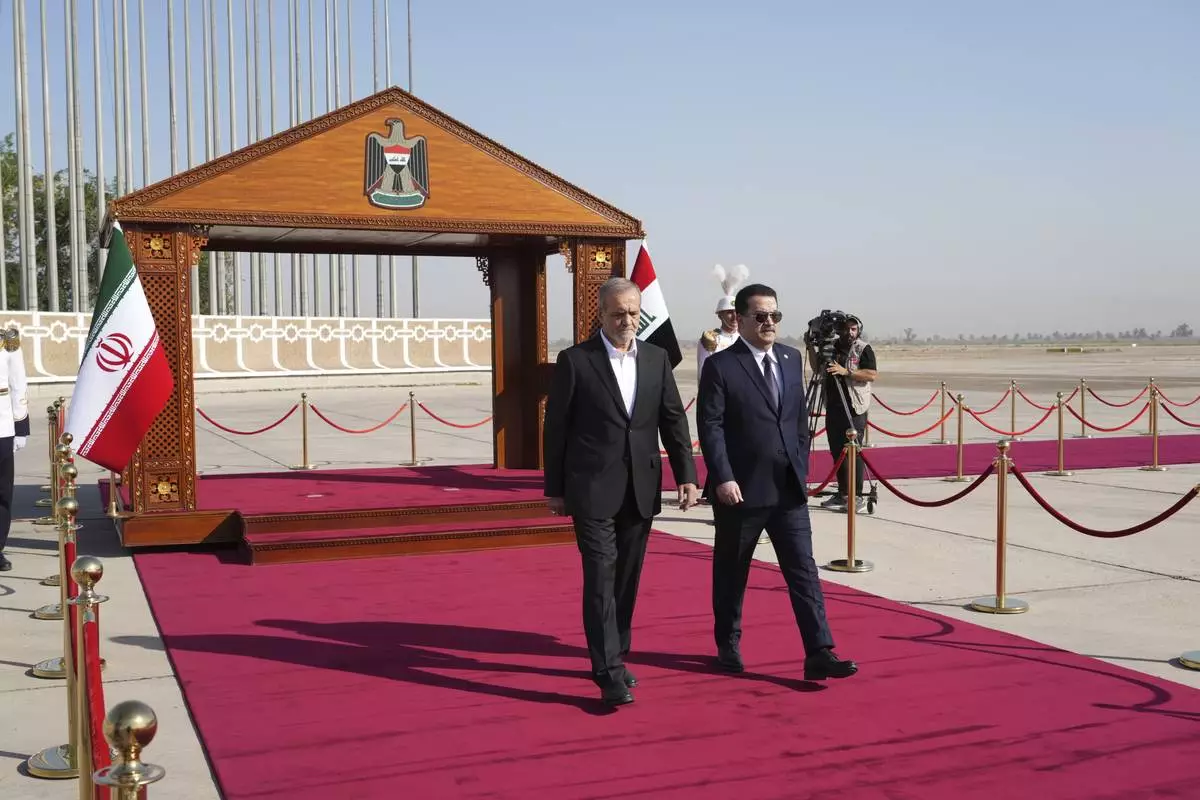
Iranian President Masoud Pezeshkian is welcomed by Iraqi Prime Minister Mohammed Shia al-Sudani, right, with an official ceremony at the Baghdad International Airport in Baghdad, Iraq, Wednesday Sept. 11, 2024. (Murtadha Al-Sudani/Pool Photo via AP)
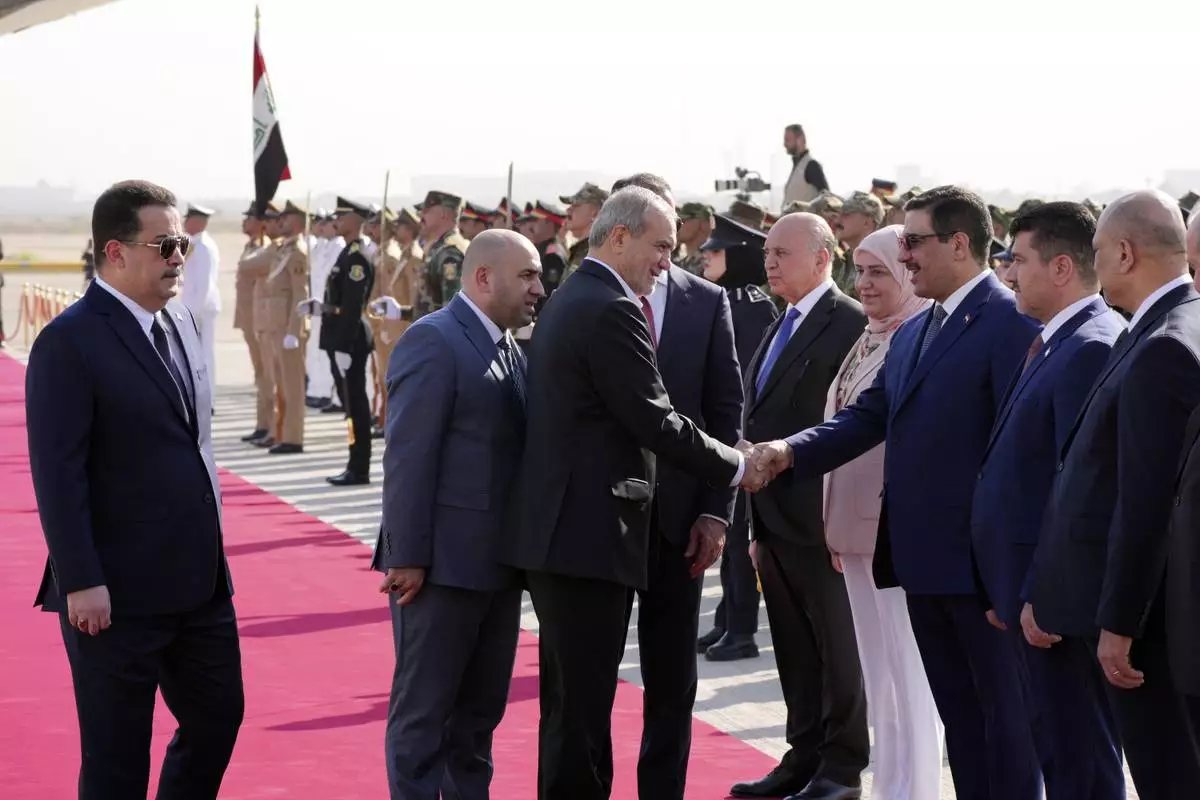
Iranian President Masoud Pezeshkian, center, is welcomed by Iraqi Prime Minister Mohammed Shia al-Sudani, left, with an official ceremony at the Baghdad International Airport in Baghdad, Iraq, Wednesday Sept. 11, 2024. (Murtadha Al-Sudani/Pool Photo via AP)
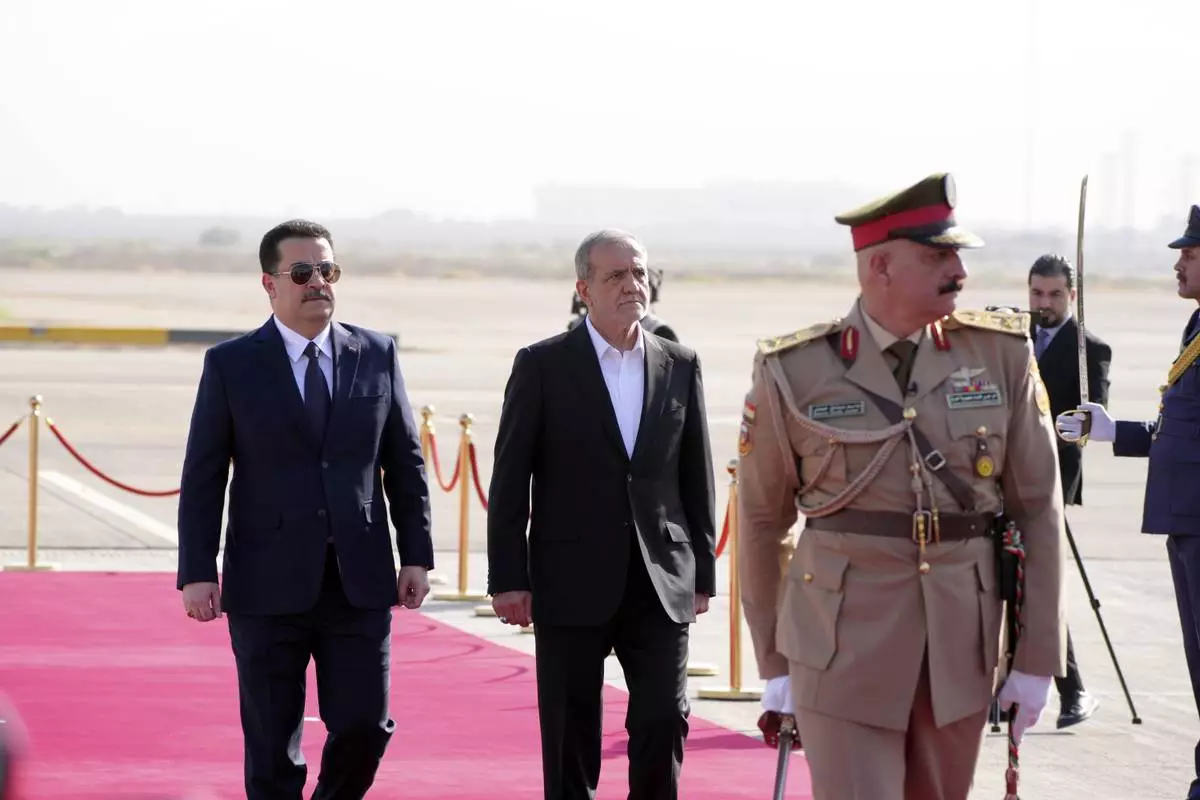
Iranian President Masoud Pezeshkian is welcomed by Iraqi Prime Minister Mohammed Shia al-Sudani, left, with an official ceremony at the Baghdad International Airport in Baghdad, Iraq, Wednesday Sept. 11, 2024. (Murtadha Al-Sudani/Pool Photo via AP)
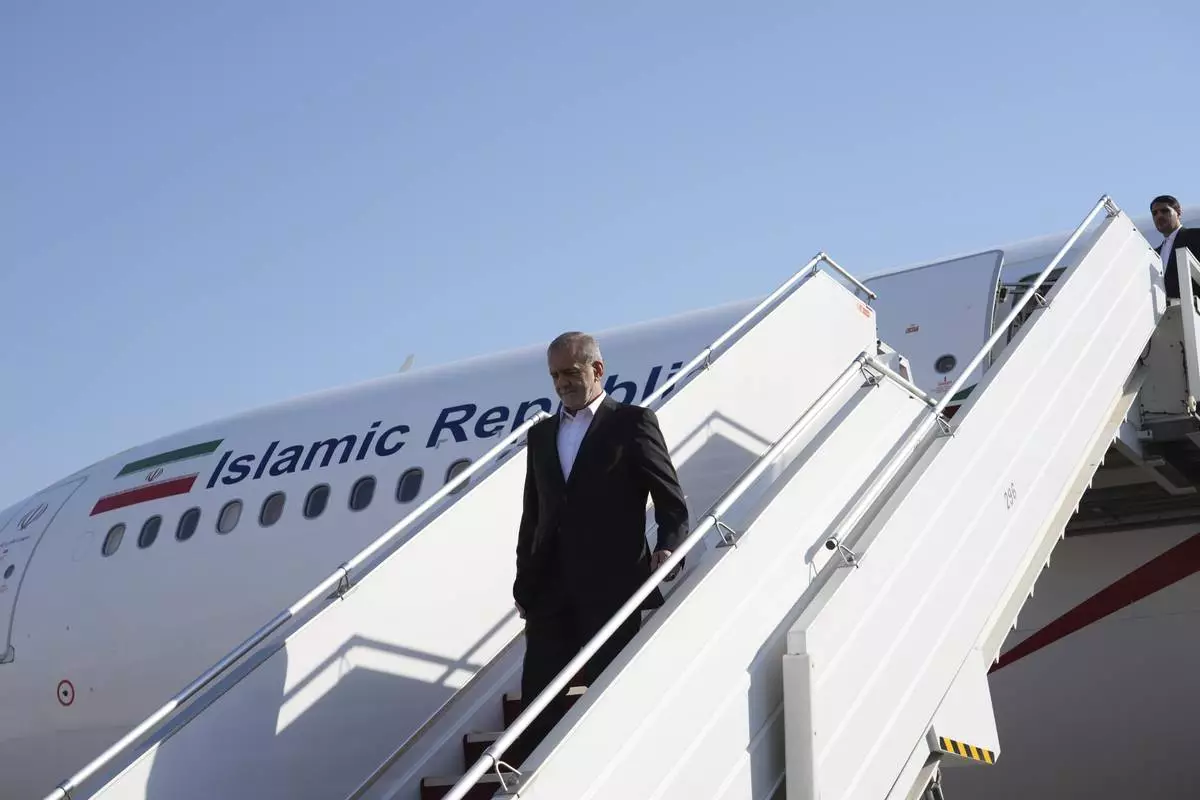
Iranian President Masoud Pezeshkian arrives at the Baghdad International Airport in Baghdad, Iraq, Wednesday Sept. 11, 2024. (Murtadha Al-Sudani/Pool Photo via AP)
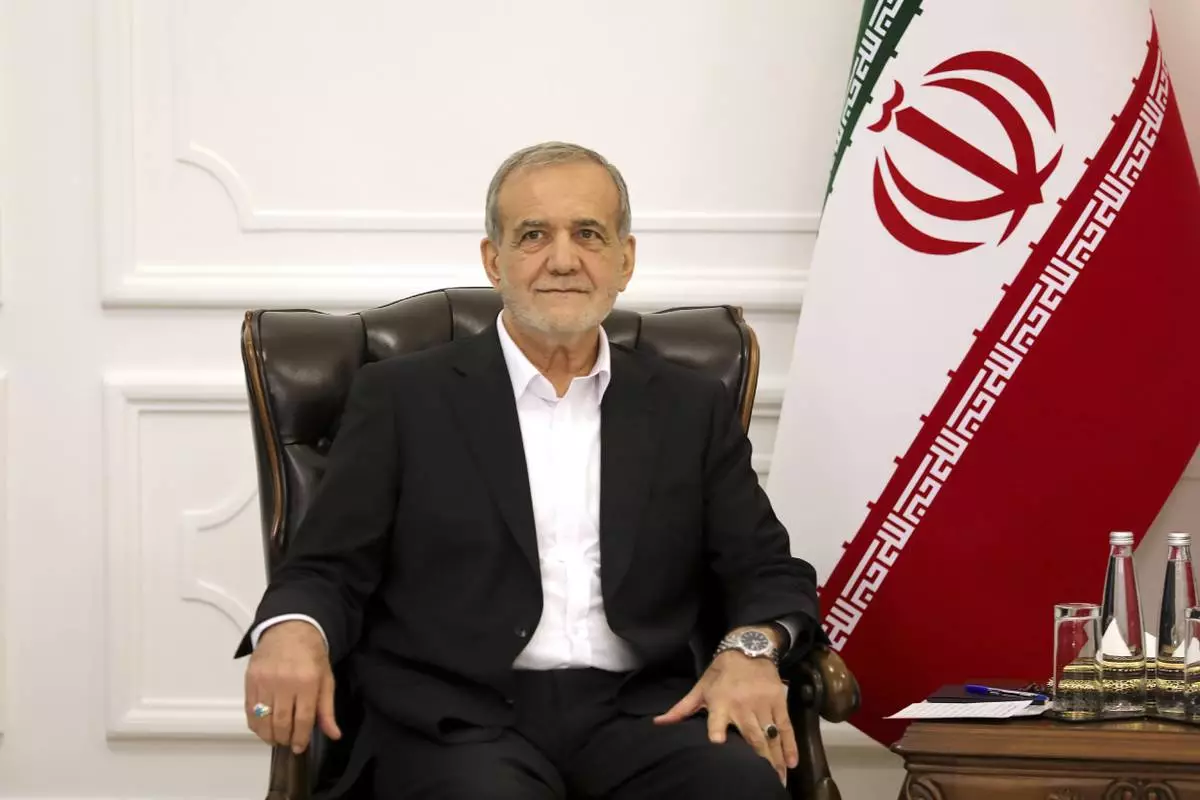
Iranian President Masoud Pezeshkian meets Iraqi Prime Minister Mohammed Shia al-Sudani, unseen, at the government palace in Baghdad, Iraq, Wednesday, Sept. 11, 2024. (Ahmed Jalil/Pool Photo via AP)
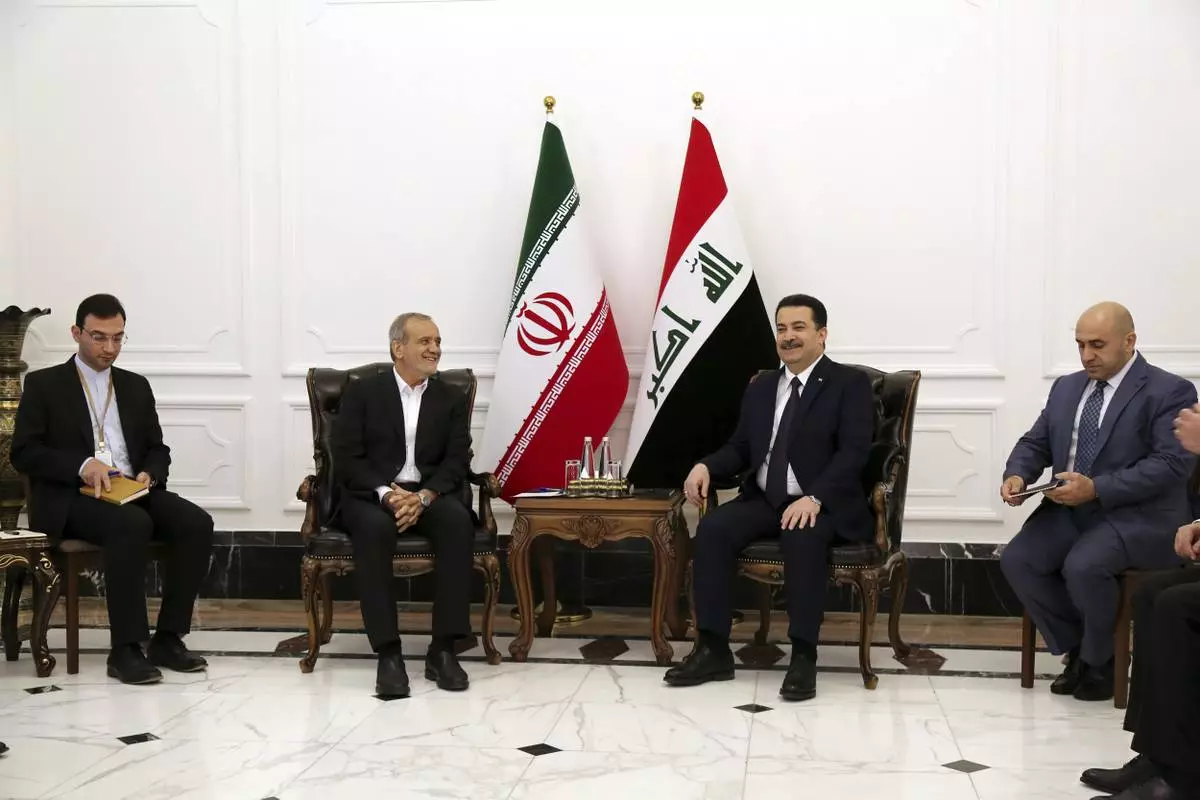
Iranian President Masoud Pezeshkian, center left, and Iraqi Prime Minister Mohammed Shia al-Sudani, center right, meet at the government palace in Baghdad, Iraq, Wednesday, Sept. 11, 2024. (Ahmed Jalil/Pool Photo via AP)
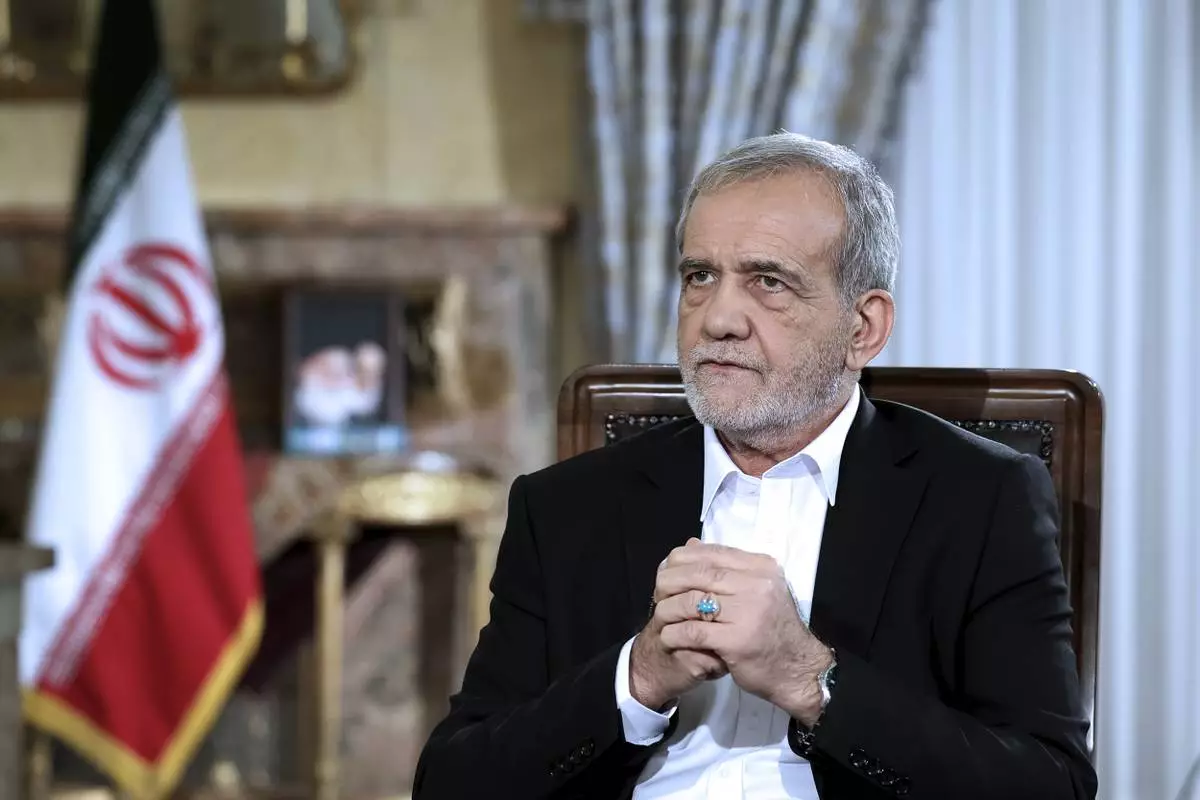
In this photo released by the Iranian Presidency Office, President Masoud Pezeshkian speaks in a live televised interview by state TV, at his office in Tehran, Iran, Saturday, Aug. 31, 2024. (Iranian Presidency Office via AP)
SRINAGAR, India (AP) — In Indian-controlled Kashmir, many people boycotted elections for decades in protest against Indian rule. But in the run-up to the local election beginning Wednesday, many are willing to buck that trend and use their vote to deny Prime Minister Narendra Modi’s party the power to form a local government in the disputed region.
The vote is the first in a decade, and the first since Modi’s Hindu nationalist government in 2019 scrapped the Muslim-majority region’s special status and downgraded the former state to a federally governed territory. The move — which largely resonated in India and among Modi supporters — was mostly opposed in the region as an assault on its identity and autonomy.
“Boycotts will not work in this election,” said Abdul Rashid, a resident in southern Kashmir’s Shangus village. “There is a desperate need to end the onslaught of changes coming from there (India).”
The election will allow residents to have their own truncated government and a local parliament called an assembly, instead of remaining under New Delhi’s direct rule. The region’s last assembly election was held in 2014, after which Modi’s Bharatiya Janata Party for the first time ruled the region in a coalition with the local Peoples Democratic Party.
But the government collapsed in 2018 after BJP withdrew from the coalition. Polls in the past have been marked with violence, boycotts and vote-rigging, even though India called them a victory over separatism.
This time, New Delhi says the polls are ushering in democracy after more than three decades of strife. However, many locals see the vote as an opportunity not only to elect their own representatives but also to register their protest against the 2019 changes.
Polling will be held in three phases. The second and third phases are scheduled for Sept. 25 and Oct. 1. Votes will be counted on Oct. 8, with results expected that day.
Kashmir is divided between nuclear-armed rivals India and Pakistan. Since 1947, the neighbors have fought two wars over its control, after British rule of the subcontinent ended with the creation of the two countries. Both claim the Himalayan territory in its entirety.
In 2019, the Indian-controlled part of the region was divided into two territories, Ladakh and Jammu-Kashmir, ruled directly by New Delhi. The region has been on edge since it lost its flag, criminal code, constitution and inherited protections on land and jobs.
Multiple pro-India Kashmiri parties, many of whose leaders were among thousands jailed in 2019, are contesting the election, promising to reverse those changes. Some lower-rung separatist leaders, who in the past dismissed polls as illegitimate exercises under military occupation, are also running for office as independent candidates.
India’s main opposition Congress party, which favors restoration of the region’s statehood, has formed an alliance with the National Conference, the region’s largest party. Modi’s BJP has a strong political base in Hindu-dominated areas of Jammu that largely favor the 2019 changes but is weak in the Kashmir Valley, the heartland of anti-India rebellion.
“Our main concern is governance through local representatives. It will be good for us if the BJP forms the government here as it’s already in power at the center,” said Chuni Lal, a shopkeeper in Jammu city.
The vote will see a limited transition of power from New Delhi to the local assembly, with a chief minister at the top heading a council of ministers. But Kashmir will continue to be a “Union Territory” — a region directly controlled by the federal government — with India’s Parliament remaining its main legislator.
The elected government will have partial control over areas like education, culture and taxation but not over the police. Kashmir’s statehood must be restored for the new government to have powers similar to other states in India. However, it will not have the special powers it enjoyed before the 2019 changes.
Last year, India’s Supreme Court endorsed the government’s 2019 changes but ordered New Delhi to conduct local polls by the end of September and restore Kashmir’s statehood. Modi’s government has promised to restore statehood after the polls but has not specified a timeline.
Elections in Indian-held Kashmir have remained a sensitive issue. Many believe they have been rigged multiple times in favor of local politicians who subsequently became India’s regional enforcers, used to incrementally dilute laws that offered Kashmir a special status and legitimize New Delhi’s militaristic policies.
In the mid-1980s, the region’s dissident political groups emerged as a formidable force against Kashmir’s pro-India political elite but lost the 1987 election widely believed to have been rigged. A public backlash followed, with some young activists taking up arms and demanding a united Kashmir, either under Pakistani rule or independent of both.
India insists the insurgency is Pakistan-sponsored terrorism, a charge Islamabad denies. Tens of thousands of people have been killed in the fighting, which most Kashmiri Muslims consider a legitimate freedom struggle.
Noor Ahmed Baba, a political scientist, said the outcome of the polls “is not going to change the dynamics of the Kashmir dispute” since it will end with a largely powerless legislature, but will be crucial for optics.
“If local parties win, it is going to put some pressure on the central government and perhaps delegitimize from a democratic perspective what has been done to Kashmir. But a BJP win can allow the party to consolidate and validate 2019 changes in the local legislature,” Baba said.
India’s ruling BJP is not officially aligned with any local party, but many politicians believe it is tacitly supporting some parties and independent candidates who privately agree with its stances.
The National Conference party says Modi’s BJP is trying to manipulate the election through independent candidates. “Their (BJP’s) concerted effort is to divide the vote in Kashmir,” said Tanvir Sadiq, a candidate from the National Conference.
The BJP’s national secretary, meanwhile, says his party’s former ally, the Peoples Democratic Party, and the National Conference are being supported by former militants. Ram Madhav said at a recent rally that they want to return the region to its “trouble-filled days.”
For residents whose civil liberties have been curbed, the election is also a chance to choose representatives they hope will address their main issues.
Many say that while the election won’t solve the dispute over Kashmir, it will give them a rare window to express their frustration with Indian control.
“We need some relief and end of bureaucratic rule here,” said Rafiq Ahmed, a taxi driver in the region’s main city of Srinagar.
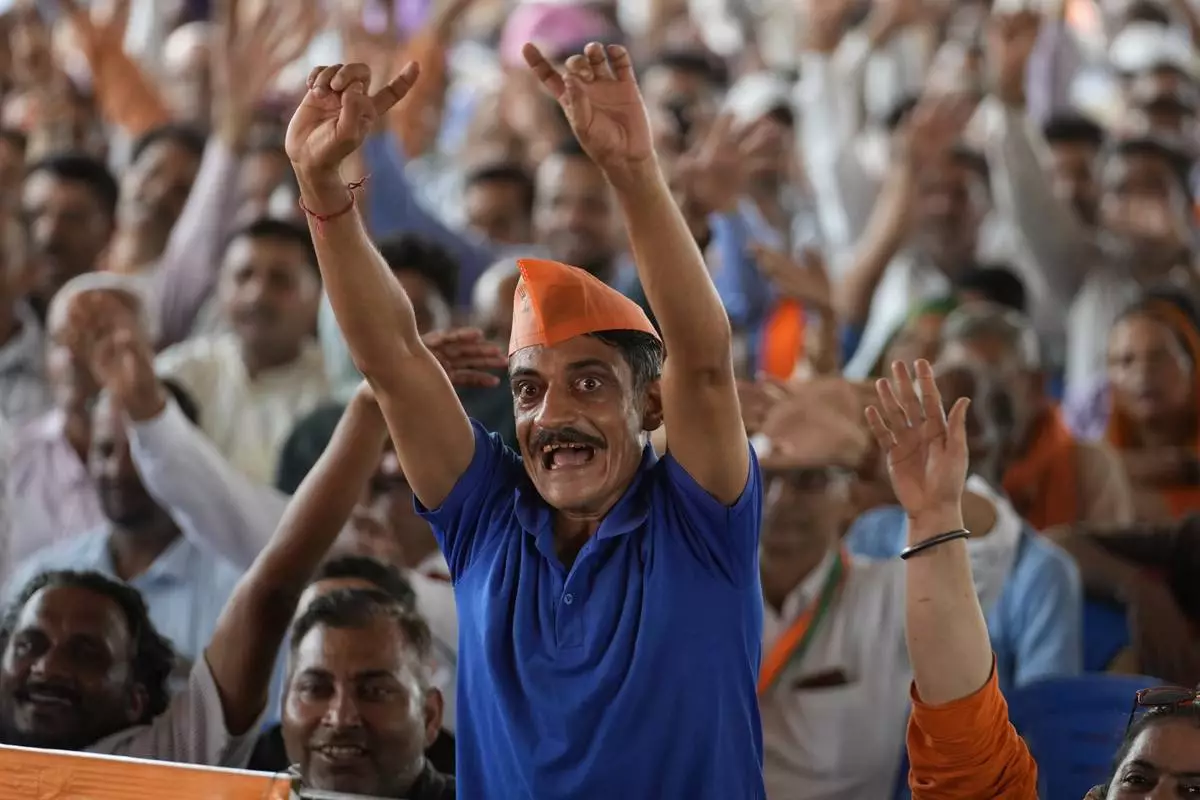
Bharatiya Janata Party (BJP) party workers attend a rally, ahead of Jammu and Kashmir Assembly elections in Jammu, India, Saturday Sep.7, 2024.(AP Photo/Channi Anand, File)
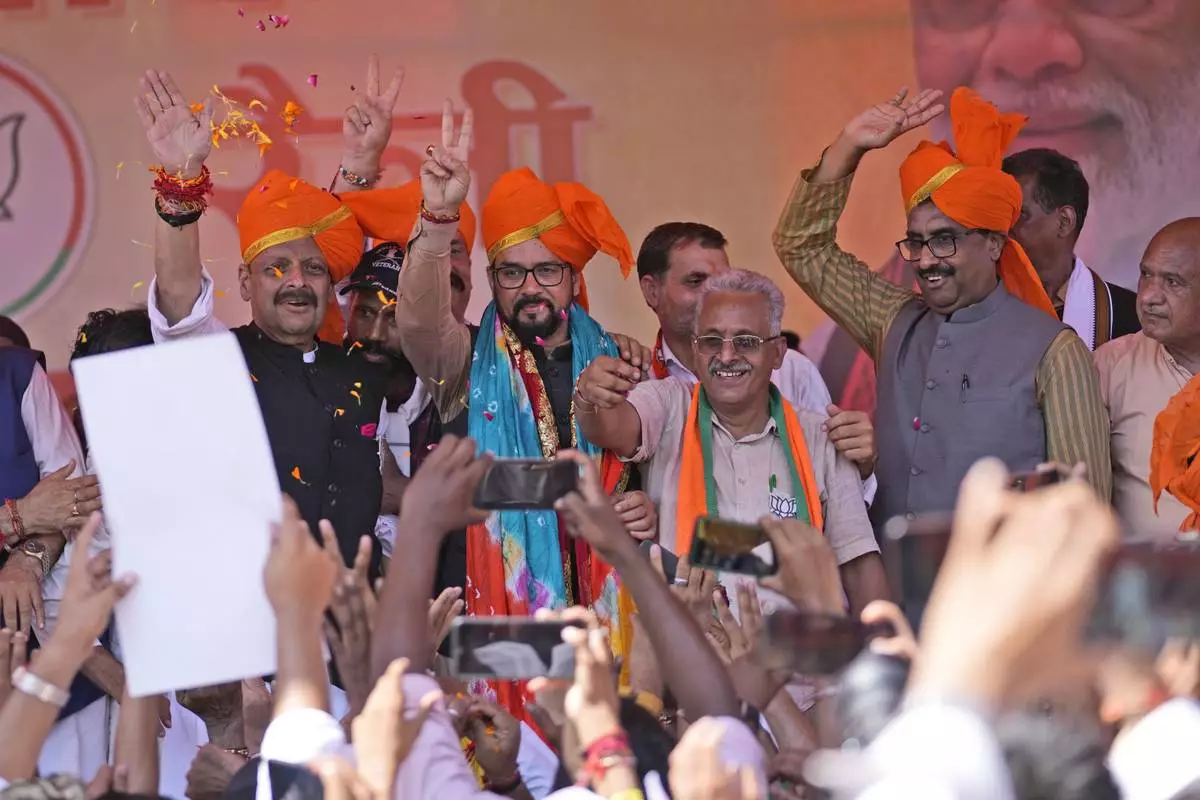
Former union minster and star campaigner of BJP Anurag Thakur and state in charge Ram Madhav wave to supporters during a campaign rally, after party candidates filed the nomination papers for the upcoming Jammu and Kashmir Assembly elections at Nagrota outskirts of Jammu, India, Thursday, Sep.12, 2024.(AP Photo/Channi Anand, File)
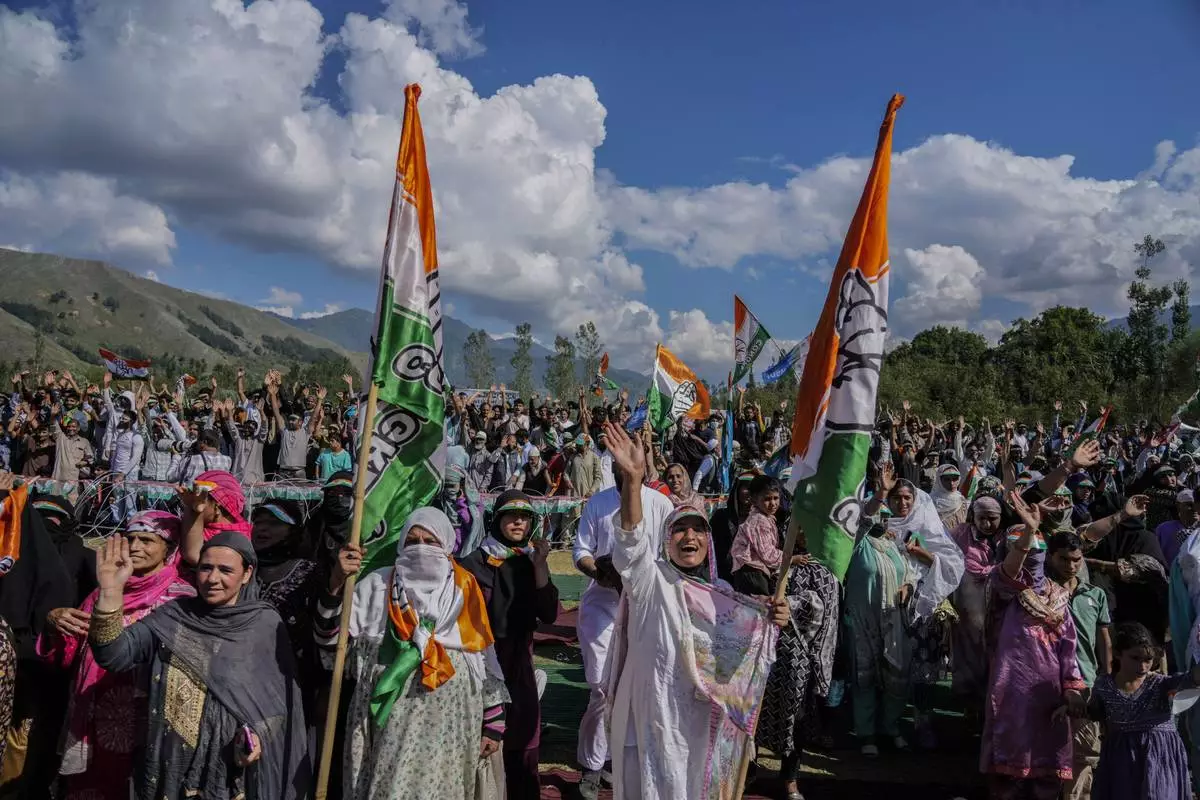
Supporters of India's opposition Congress party, wave during an election rally at Dooru some 78 kilometers (49 miles) south of Srinagar, Indian controlled Kashmir,Wednesday, Sept. 4, 2024. (AP Photo/Mukhtar Khan, File)
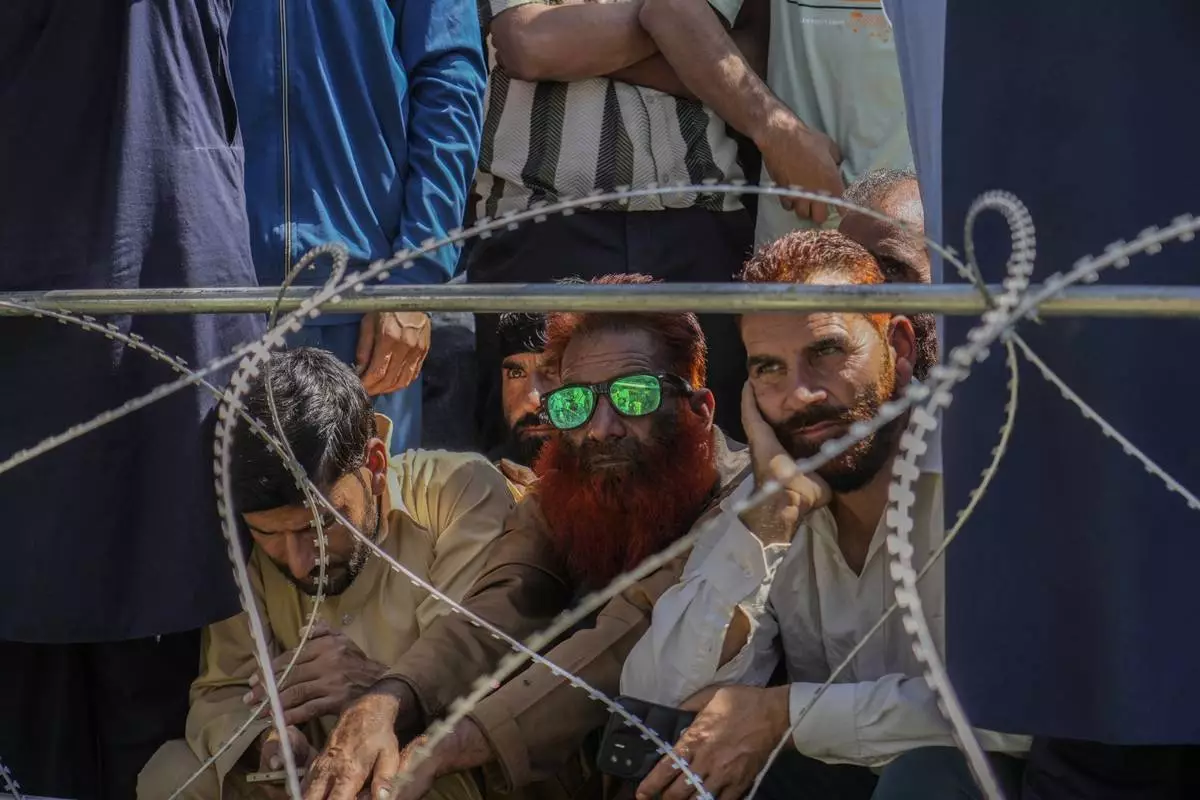
Supporters of Awami Ittehad Party (AIP) leader Sheikh Abdul Rashid, also known as Engineer Rashid, attend a public rally at Baramulla, some 55 kilometers (34 miles) north of Srinagar, Indian controlled Kashmir, Sept. 12, 2024. (AP Photo/Mukhtar Khan, File)
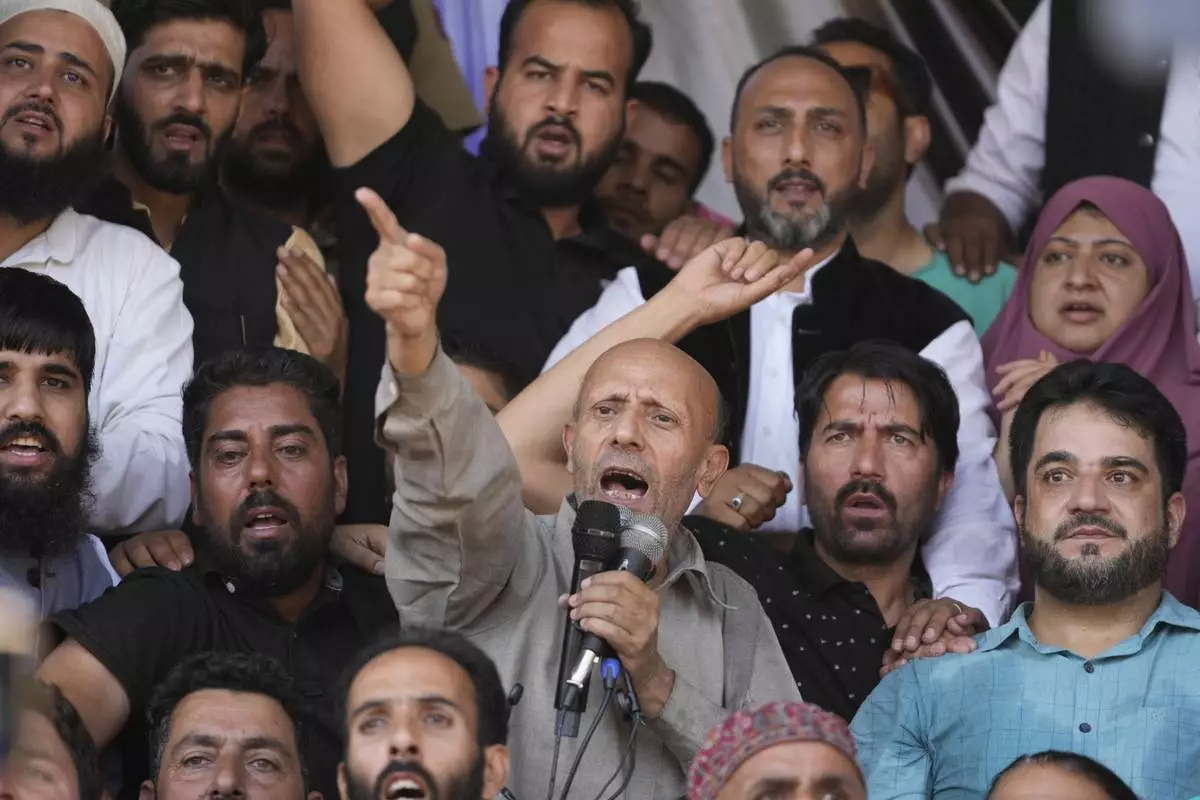
Awami Ittehad Party (AIP) leader Sheikh Abdul Rashid, also known as Engineer Rashid, speaks during a public rally at Baramulla, some 55 kilometers (34 miles) north of Srinagar, Indian controlled Kashmir, Sept. 12, 2024. (AP Photo/Mukhtar Khan, File)
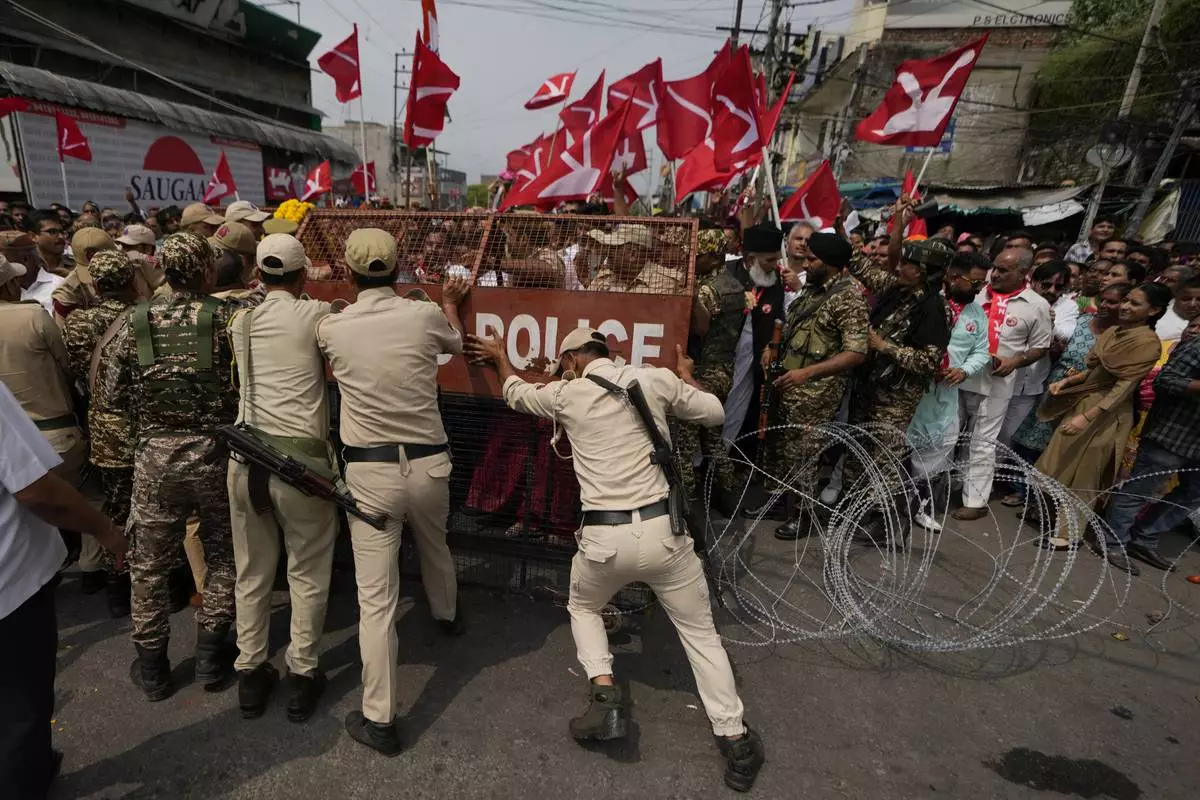
Policemen stop supporters of National Conference Party from accompanying their candidate during the filing of nomination papers for the upcoming Jammu and Kashmir Assembly elections in Jammu, India, Sept.10, 2024. (AP Photo/Channi Anand, File)
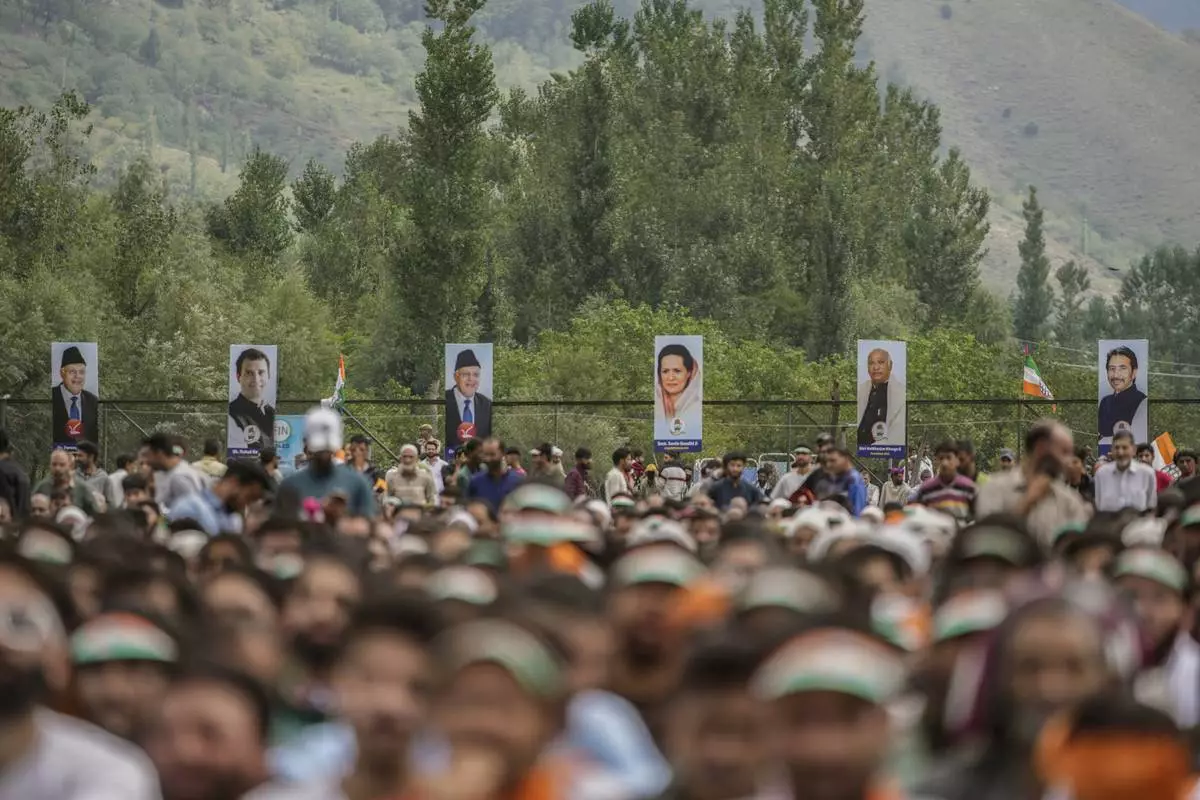
Supporters listen as India's opposition Congress party leader Rahul Gandhi, unseen, speaks during an election rally at Dooru some 78 kilometers south of Srinagar, Indian controlled Kashmir, Wednesday, Sept. 4, 2024. (AP Photo/Mukhtar Khan, FILE)
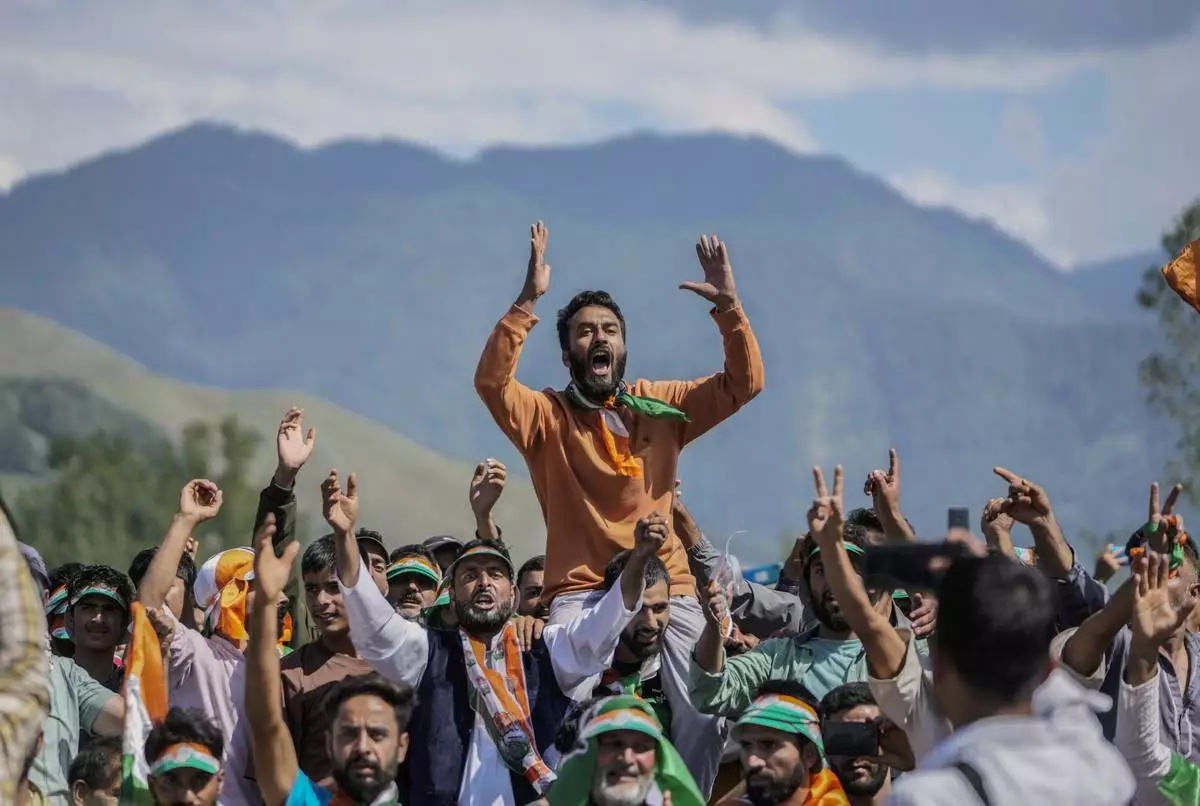
Supporters of India's opposition Congress party leader Rahul Gandhi, shout slogans during an election rally at Dooru, some 78 kilometers south of Srinagar, Indian controlled Kashmir, Sept. 4, 2024. (AP Photo/Mukhtar Khan, File)
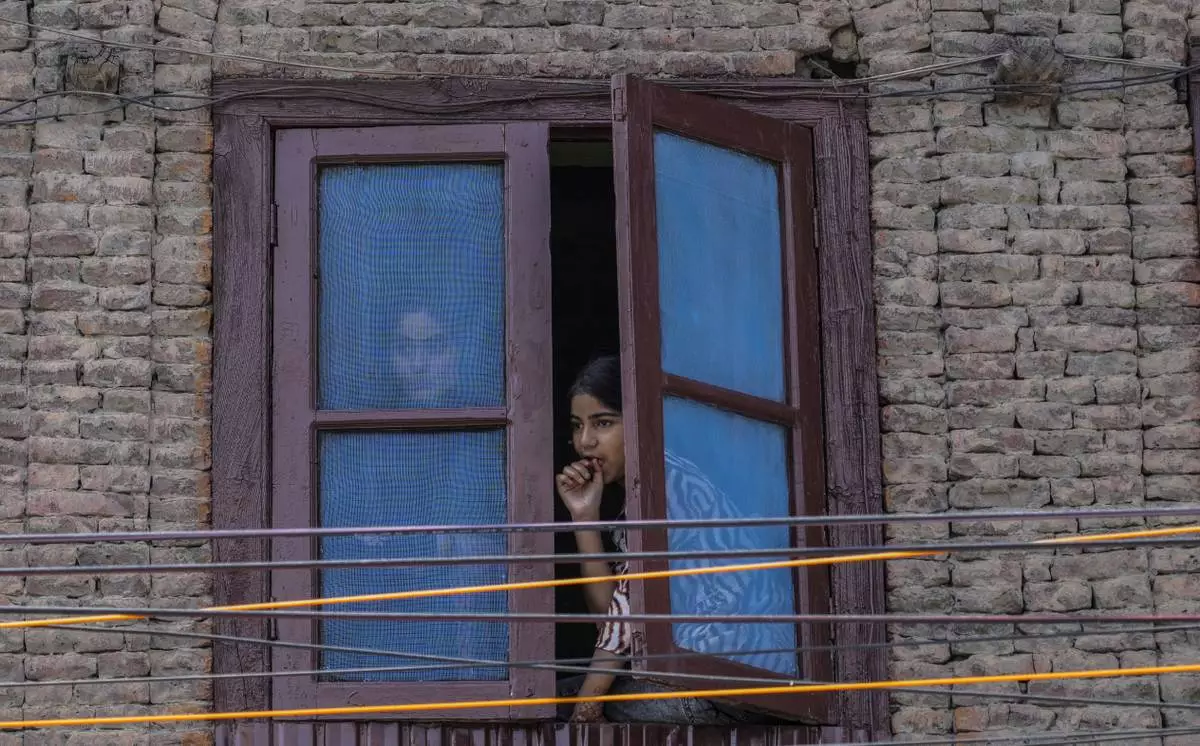
People watch from a window during a road show of Peoples Democratic Party (PDP) candidate Arif Laigroo, in Srinagar, Indian-controlled Kashmir Sunday, Sept. 15, 2024. (AP Photo/Mukhtar Khan, File)
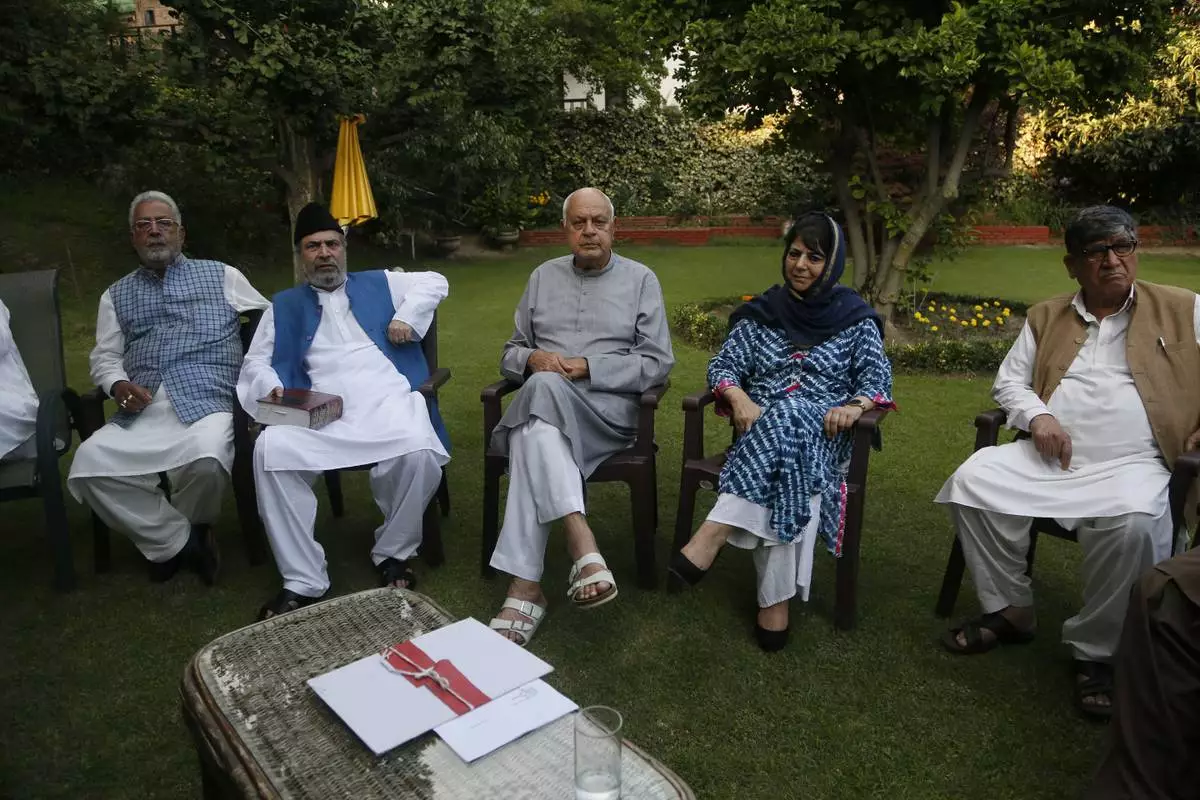
National Conference (NC) President Farooq Abdullah, center, Peoples Democratic Party (PDP) leader Mehbooba Mufti, second right, and other leaders sit during an all parties meeting on restoration of the special status that was stripped last year from Indian-administered Kashmir, in Srinagar, India. (AP Photo/Mukhtar Khan, File)
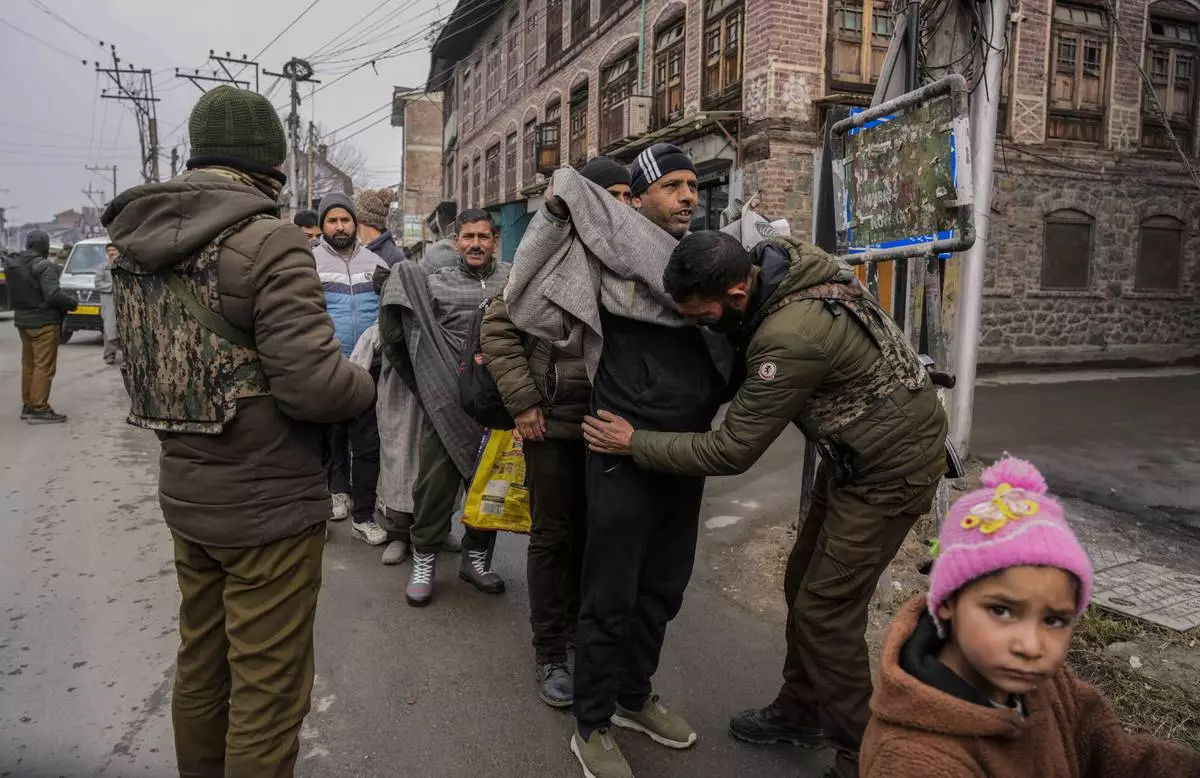
A child looks on as Indian policemen frisk Kashmiri pedestrians during a surprise security check in Srinagar, Indian controlled Kashmir, Monday, Jan. 9, 2023. (AP Photo/Mukhtar Khan, File)
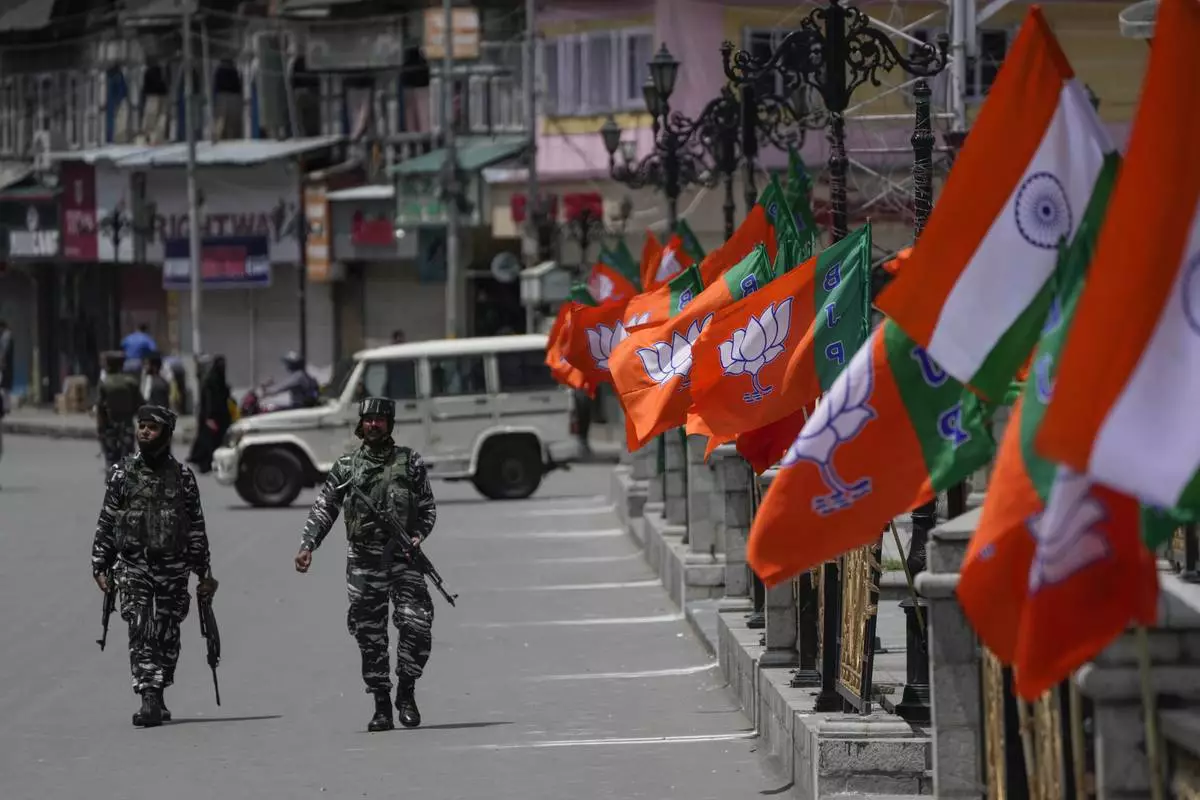
Indian security forces walk past Indian flags and flags of India's ruling Bharatiya Janata Party (BJP) as a motorcycle rally by BJP youth wing to the Kargil War Memorial passes through Srinagar, Indian controlled Kashmir, Monday, July 25, 2022. (AP Photo/Mukhtar Khan, File)
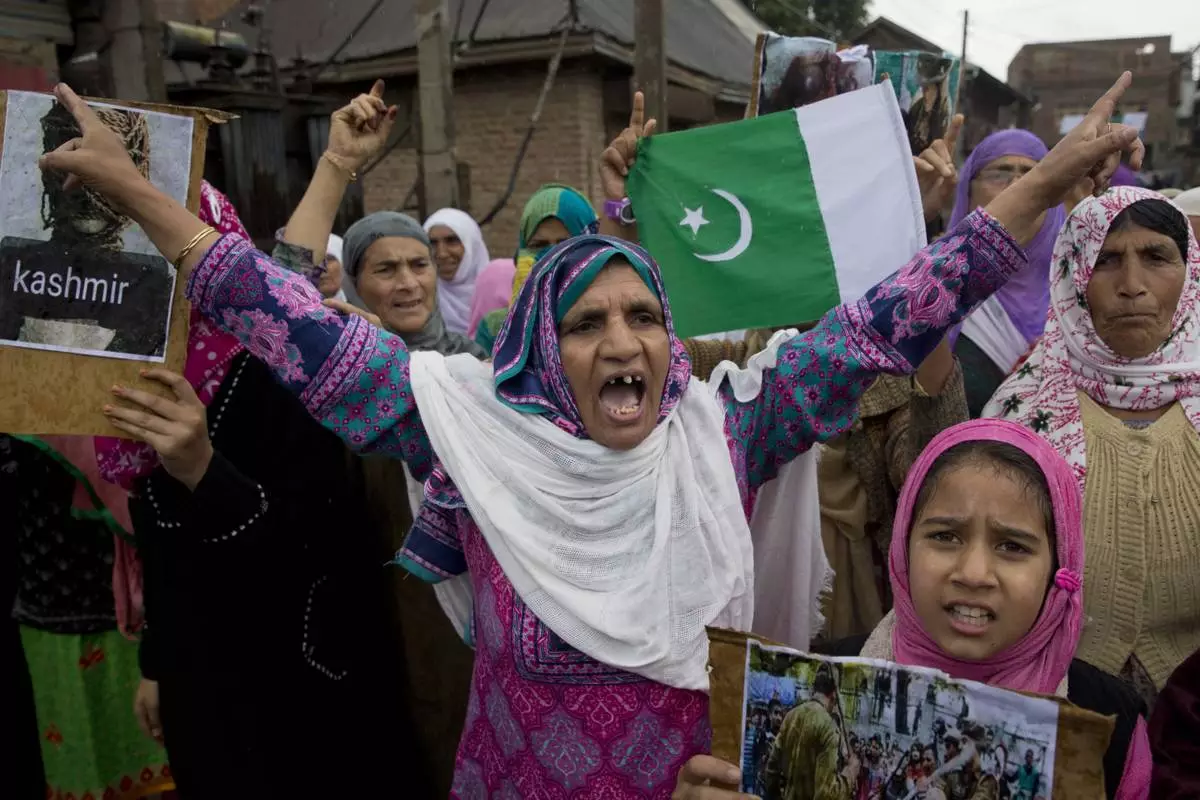
Kashmiris shout slogans during a protest after Friday prayers against the abrogation of article 370, on the outskirts of Srinagar, Indian controlled Kashmir, Friday, Oct. 4, 2019.(AP Photo/ Dar Yasin, File)
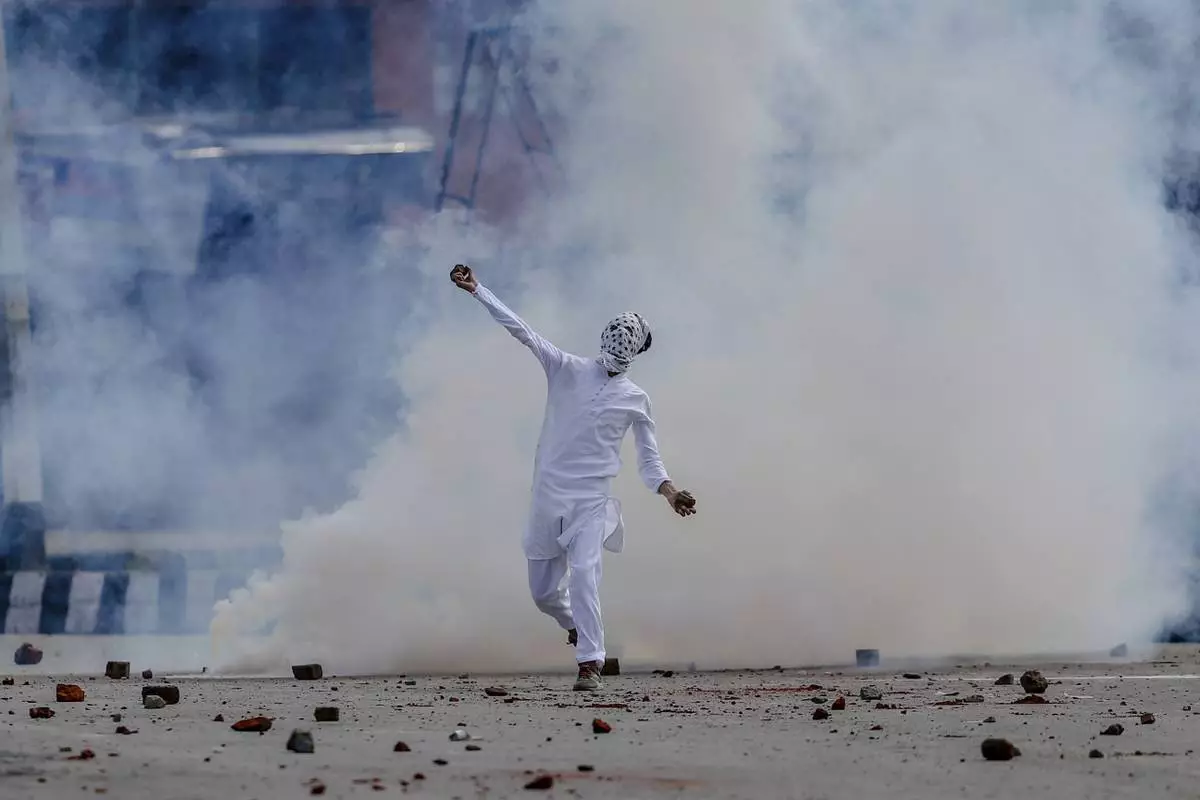
A masked protester throws stone at Indian security forces during a protest after Eid prayers in Srinagar, Indian controlled Kashmir, Saturday, June 16, 2018. (AP Photo/Dar Yasin, File)
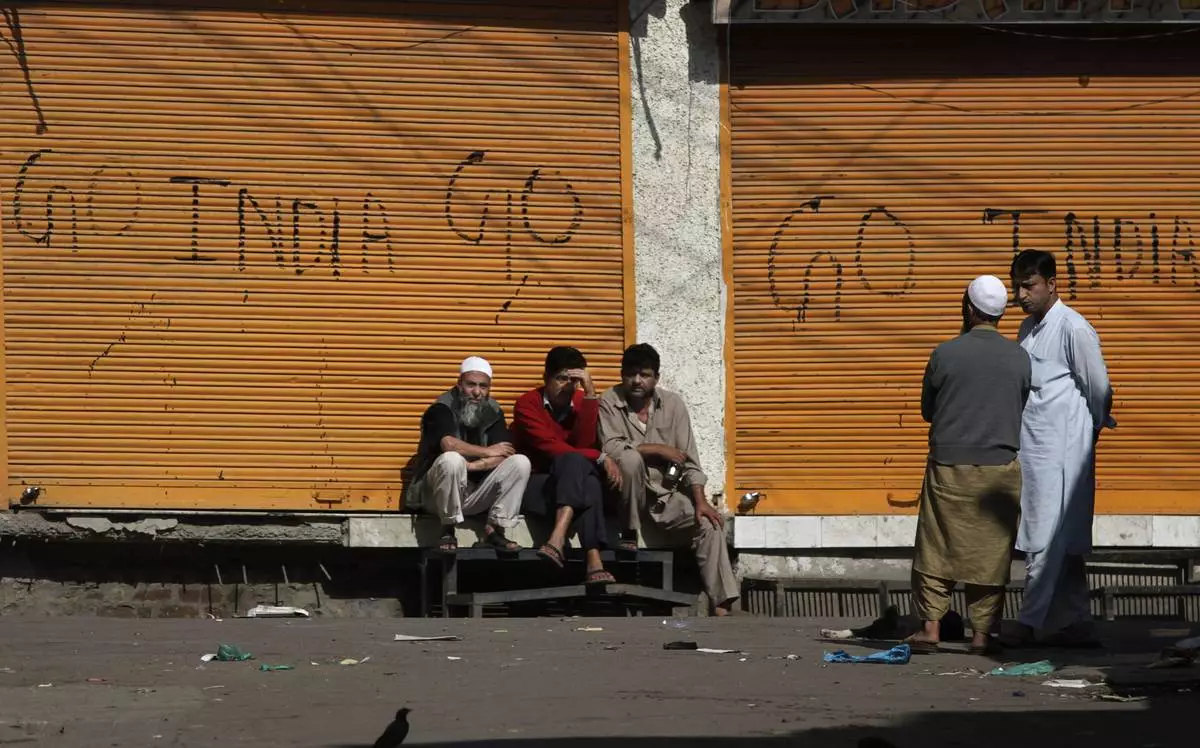
Kashmiris sit outside closed shops painted with graffiti during a curfew in central Srinagar, India, Thursday, Sept. 16, 2010. (AP Photo/Dar Yasin, File)













